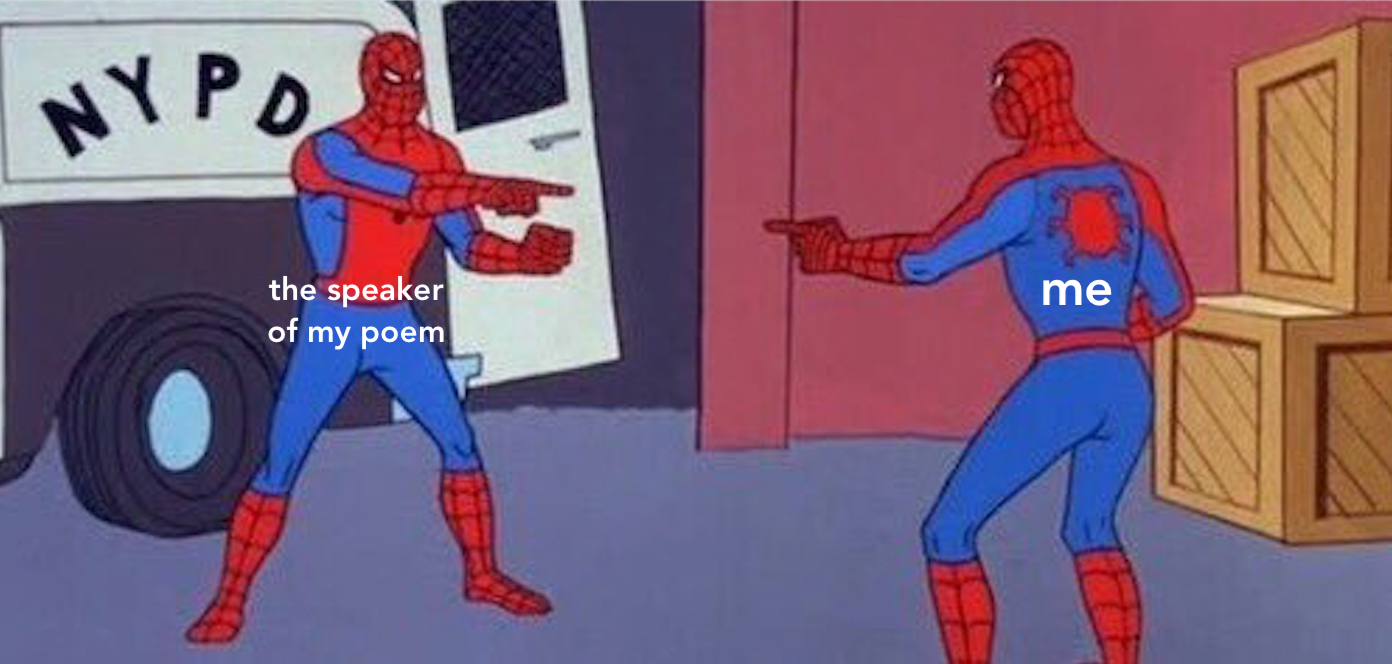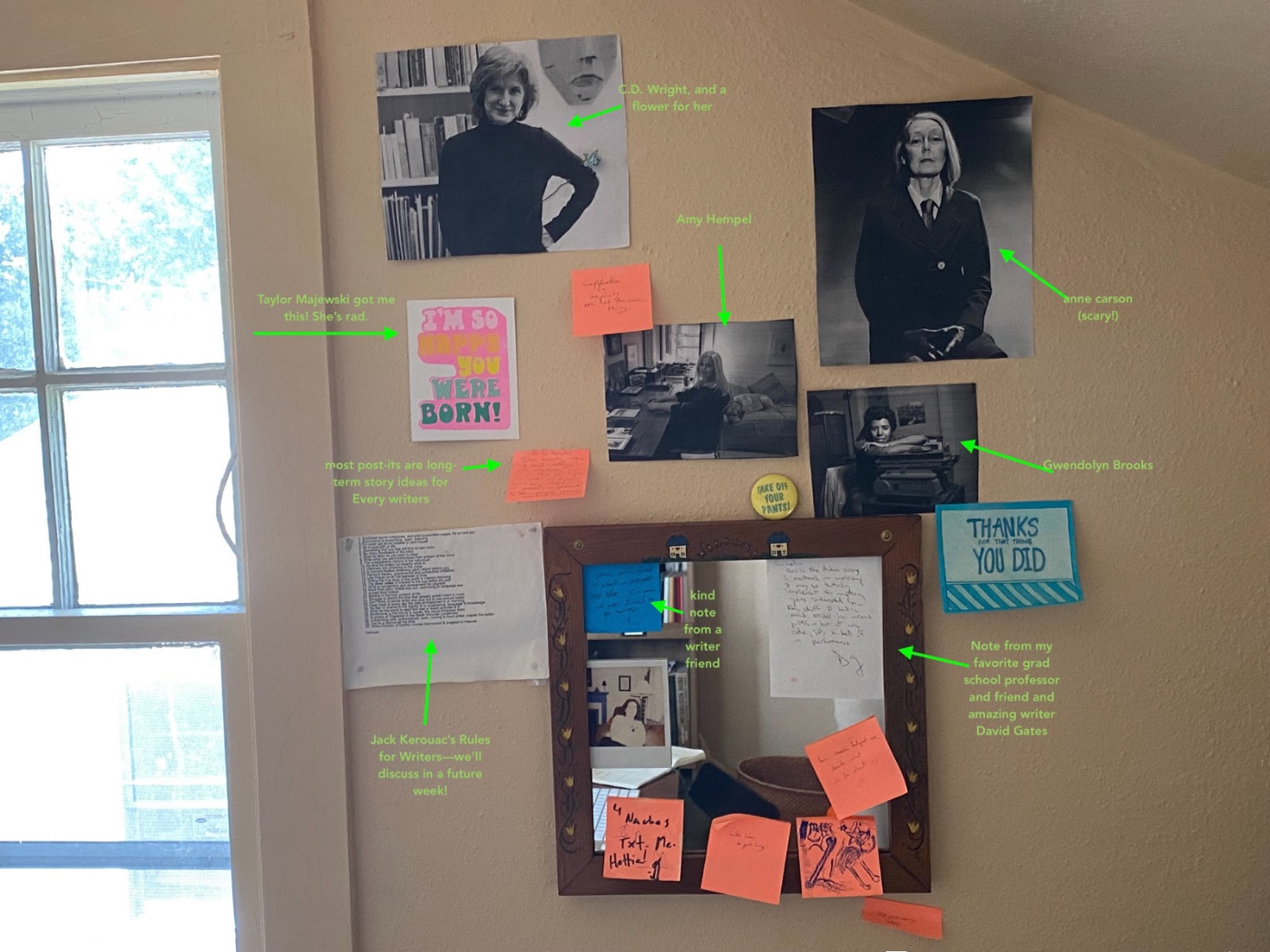
“Reality is a sound, you have to tune in to it not just keep yelling.”
Anne Carson, Autobiography of Red
Hello, listeners! It’s been a while. I’m excited to announce a new component to TLC that I’ve been gearing up for: The Long Conversation: The Newsletter!
Each Monday you’ll get my answer to a question in writing, reading, and editing, plus writing exercises and prompts, tips and ruminations. Check out the end of this post to submit questions for me to answer! This week’s question comes from a member of our subscriber Discord community.
Ellen asks: What is “voice” in writing, and how do I find mine? Thanks for asking, Ellen! This is one of the most common questions I get from active and aspiring writers alike, so let’s dive in and start from the top:
What the fuck is "voice"?
Your voice is a tree
The simplest, best definition (imo) of voice for nonfiction writers is point of view. Rather than your knowledge or expertise, your opinion or even your attitude, your true voice reflects your experiences and therefore your perspective. It is unique to you.
Ok, so that’s what it means theoretically. But how do you go about finding your so-called point of view anyway? Let’s try it literally. There’s an exercise I used to do with new writing students back when I was in grad school teaching courses in poetry and composition & rhetoric. The exercise was simple enough. I’d just walk up to the board just before class and write the following:
Picture a tree.
I’d lean up against my desk while my students filtered in eyeing the board, then ask them to write down the story of the tree they’d conjured in their minds. Some kids would laugh, surprised to find that they had in fact pictured a very specific tree, a tree that they had known—it doesn’t always register to us how much of the world we filter through our own experiences. I let them write for five minutes, and then we’d share the stories of our trees.
(This exercise was inspired by my father, who used to “punish” me and my sister when we were bad by making us sit in a chair and meditate. He would give us koans to consider, like, “What is the sound of one hand clapping?” and a favorite, kid-sized one, “If you were a tree, what kind of tree would you be?” I used to ask students that version, but “picture a tree” isn’t as leading, and offers more opportunity for reflection because it’s open-ended. If you want to do it too, just picture a tree, and then put your pencil on your paper and write about it.)
The point is, none of my students ever pictured the same tree (and some people don’t “picture” at all). There is no generic “tree” that we all go to in our minds. You might think of the old oak out back of your childhood home, the one you fell off of when you were ten. Or the willow you had your first kiss under. Or the yew you planted in remembrance of someone. Or the one you saw pulled up by its roots after that storm. Hundreds of students, hundreds of trees, never two the same.
Now don’t worry, we’re going to get more concrete down the page a bit. But this is the first best step, to recognize that what you see is unique to you: honeys, you already have a voice. All you have to do to be certain is:
Picture a tree.
Whatever rose and converged in you to conjure that specific tree is the same stuff that makes up your writer’s voice. Your experiences, everything you’ve integrated into your reality, your conception of the world, how your mind goes from one place to another, the threads of your body connecting it to past iterations of the self, what you feel in your body at this moment. Your voice is everything you’ve seen and known and everything that hurts and how you feel pleasure and all that you find wonderful and everything you wonder about the world.
So whenever you’re struggling to figure out what your voice is, remember your tree. Only you could have conjured that tree. Sit beneath it and look out at the world and begin.
Is your writing voice your voice voice?
This question comes up a lot too, so let’s try and get into it! Is your writing voice different from the voice you use in life?
Yes and no. Certainly in fiction you can write any number of voices. In poetry, we talk about the “speaker” of a poem: unless you’re deliberately imagining your way into another perspective for the purpose of a poem, the “speaker” is usually assumed to be the poet themselves, but poets will usually get mad about this because they want to say lots of stuff in their work and don’t want to worry about whether it has to be “real.” (Poets have a lot of feelings about this (they just, like, have a lot of feelings). Any poets in the audience don’t @ me, I’m one of you so I can say whatever I want.)
I am not the first memer to meme this meme.
Things are a little different for non-fiction writers, though.
🚨 WARNING WARNING WARNING THIS IS JUST MY OPINION 🚨 For people trying to find their voice as nonfiction writers, it’s AWESOME to experiment with different personas until you find different pieces that fit. But the goal of that experimentation should be to find the voice you would be comfortable using in life. Here’s why I think that!
Writers, especially people newer to writing (and I’m sorry to call them out but especially younger writers, or anyone who might not yet know a whole helluva lot about themselves), often adopt completely different voices from their own in their nonfiction writing. Again, this can be a fun experiment and can be a great way to stretch your writing skills and figure out how you actually sound, but those who stick with a character are often struggling to figure out why they’re writing in the first place. It can get dangerous if you adopt a kind of character in your public writing before you know what your authentic voice is. It can become a kind of “just asking questions” ethos, where you let your writer voice say all kinds of things you yourself never would say, just to get a rise out of people. (It’s why I think pseudonyms are a really dangerous path for most people, whistleblowers and folks at specific personal risk aside.)
That said, once you know what your real voice sounds like, then you might choose to adopt a different perspective for a certain project, and that’s great—adopting a different voice can actually be a terrific tool for thinking around a problem and imagining how your audience might interpret a certain subject. But know who you are before you step out of the house in costume, or you could get lost in it and forget where the zipper is. You want your voice to be recognizable as you. Be vigilant. Be willing and ready to say no to the impulses to stretch your voice beyond your actual experience.
Now, your writing voice doesn’t have to sound exactly like you, though, that would be cuckoo caca insahno! Writing is slower than thinking, it’s slower than speaking, so your writing voice might reflect the thoughtful you, or the tempered you, more than the erratic you or the angry you that sometimes takes center stage when you’re talking with someone or yelling at the TV. But just like how your body is still your body whether you’re running or walking, your writing voice is still your voice on a fundamental level.
The most important thing to remember is this: Your voice isn’t armor, it’s how people find their way to you. Voice isn’t something you do. It’s what’s revealed when you stop trying. The more you write, the more you’ll know who you are. That’s your voice.
Voice vs. tone vs. style
Ok, so does your voice just happen, then? Let’s compare it to a couple of other Big Writer Words and see if it helps. I bring this up because a lot of writers try to manipulate their voices instead of using tools like tone and style to better express their innate voice. (We’ll talk about other tools in future posts, and more on these too!)
First of all, you’re not dubm if you don’t know what these words mean or what the differences between them are. What differences exist between voice, tone, and style matter only inasmuch as they actually help you write well. Some people will tell you that style and voice are completely different and have nothing to do with each other. Others, and I’m one of them, will tell you that style and tone are definitely different from voice, but they’re part of your voice, because they’re literally what the audience perceives as evidence of your point of view. Ya know how a square is a rectangle but a rectangle isn’t a square? Voice is style but style isn’t voice.
Here’s the tl;dr:
Style is how something is written, from the punctuation to the package, and it’s always related to the subject matter and the audience. Style happens through diction and tone. (Some people will tell you that actually tone happens through style, and will reverse these definitions. Honestly, whatever works!)
- Diction is word choice. Based on your audience and the intention of your writing, you might choose to use contractions to establish a more casual relationship with your audience or to help them feel less intimidated by your subject matter. You might prefer to use technical words for a deeply knowledgeable audience, or more familiar words for a lay audience. Writing “washed rose” instead of “light red” is diction.
- Tone is attitude, and it’s kind of what happens when you add up all your diction choices. But it’s about what happens to the reader, not the writing. (Anne Janzer says: “Tone belongs to the reader.”) Is the writing formal or informal? Personal, subjective, or objective? Is it a piece of reportage or a diary entry? The impression a reader has of an essay is its tone. You can tell if you’ve communicated your attitude about a subject matter well if your reader “gets it.”
While style can (and does!) change from piece to piece, voice is your constant. Style and tone are tools you can master to better express your true voice. But voice is your signature, it’s fingerprints. (Even identical twins have different fingerprints--they’re produced by sound waves traveling through the womb.) Or put another way, while style and tone might be more academic considerations, voice is like how Daniel Desario explains what’s wrong with Nick Andopolis’s shitty drumming in Freaks and Geeks:
A good point.
Exercises to find your voice
So now that we know less than we did before, how do you find your voice?
Let’s start with a few exercises you can do this week! (And keep coming back, because the exercises and prompts I share will help you find and refine your voice over time—consistent writing is the one true key.)
Gather your inspirations
Create a kind of Pinterest board for the sounds, attitudes, and expressions that inspire you. A good collection of what you love is already a representation of who you are. It might be in a slide deck, or literally printed out and plastered onto posterboard, in Roam, collected in a Scrivener folder, or put up on the walls of your workspace (I do this one). Things to include:
- Quotes. I always suggest keeping a commonplace book, that is, a place where you collect lines you read or hear, from books, articles, podcasts, or from the people you know, and other tidbits from around life. Mark them with a date, and a place if it’s relevant. Pick the quotes you are most drawn to—both in content and sound—and make them easy to find. (You can read about the history of commonplace books in an awesome essay Tiago Forte wrote for Superorganizers!!)
- Songs that you turn on when you really want to feel your feelings. You can’t print out a song but you can make a writing playlist or add links to a list of inspirations. (If you work in multiple genres, one neat trick is having a song or playlist to get you into your different voices. Here’s my #1 when I’m trying to access the speaker of my poems ;) #.)
- Writers you respect. Think of voices you love, and put up cover images from your favorite books, or portraits of your favorite writers. This is corny and cool.
- Others you respect. Who inspires you in your life who is very themselves? Would they know you through your writing? Would they respect the person they meet on the page? I have notes from former teachers, my writers, my grandfathers. Keeps me grounded.
My little wall
Maximalism and self-editing
Another activity is to make a list of adjectives that describe your writing voice (whether or not you’ve been able to capture it in writing yet!). You might even ask a friend (or family member, if you dare) to say three things to describe you. Then, when you’re trying to figure out what your voice really is, push it as far as you can. Think you are absolutely hilarious? Try writing about something specific, a topic you’ve been toying with lately. Make it the funniest paragraph you can come up. Put your sense of humor into every sentence.
A friend might say, “Well, you make a lot of references.” Ok, so you love referencing pop culture, history, music, or something else. Write that paragraph with a reference in every sentence.
Most of the time, one great joke or one brilliant reference is more effective than a bunch of little jokes or a bunch of references, both of which can grate on the reader and make the writing seem effortful. To help train yourself to be a better self-editor, put that paragraph aside for an hour, then come back to it and remove a joke or reference (or whatever “evidence” of your voice you’ve chosen). Come back an hour later and do it again. Remember what Coco Chanel said: “Before you leave the house, look in the mirror and take one thing off.” That’s editing!
Finally, speak your paragraph out loud to test it for authenticity. If you don’t like the way something sounds coming out of your own mouth, it’s not your authentic voice. Keep taking things off until it sounds right.
Use prompts
As my writers all know, I absolutely love prompts—they put the gas in your creative tank, but you still get to do the steering. Prompts can help distract you from your concerns about what you’re doing right or wrong, especially when the stakes are high. High stakes will automatically put us in a vulnerable place, which can make us forget that we’re trying to do something, letting us just do it. This is what you want!
For the purpose of using a high-stakes prompt to help you find your voice, five minutes of writing won’t be that effective. You have to go for long enough that you get out of your own head, giving yourself a chance to be distracted. This week, try fifteen minutes of free writing with a simple prompt: Danger! If you’re really badass, do thirty. If you’re actually trying to get better at writing, do an hour.
That’s it on voice for now! I’ll write a lot more about voice in future posts, as well as other writing terms as best I can. For now, your takeaway is this: The more you write, the more your voice will reveal itself to you. Let yourself get distracted from the goal, because voice happens when you’re busy thinking of something more important. Imitate others on your journey but don’t become Jim Carrey in The Mask. Walk out the back door and visit your tree. Sit quietly and let the wind blow through its branches. Listen. Listen, listen, listen.
Song of the week!
I don’t know if you guys have heard of it, but I’m a huge fan of this thing called music. Music plays an important role in my own writing process and at least one person has publically lauded my taste (thanks, Andy!) so thought I’d include what I’m loving each week in this newsletter. Hope you enjoy!
Do You Want My Job, Little Village
Formed in 1991, the supergroup Little Village—Ry Cooder, John Hiatt, Jim Keltner, and Nick Lowe—produced one album, Little Village, in 1992 before disbanding. In a 2007 interview with AV Club, Lowe said about the band: “Little Village was really good fun. Unfortunately, the record we did was no good. I suppose on some level, it worked, but Warner Brothers kind of gave us too much time to do it. We should have been forced to do it much quicker, and I think it would have been better.”
Let that be a reminder to you all: Deadlines are a blessing. Speaking of, give Rachel Syme’s essay on the magic and malice of the writer’s deadline a quick read, from this week’s New Yorker: “What Deadlines Do To Lifetimes: Can we find a balance between structuring our time and squandering it?”
Bonus writing tip!
Luckily, the rules of grammar have not caught up to Citizens United.
Love it? Hate it? Please share your feedback on this first newsletter edition of The Long Conversation at the bottom of this post! To submit a question that might get answered in the coming weeks, email me at rachel@every.to, and follow me on Twitter @DidYouWriteThat for more insights, cool stuff to read, and professional-level comedy.
Ask Me Anything!
What topics on writing and editing will TLC cover? I want to answer your questions directly! If there’s anything you’ve wanted to ask an editor, or me specifically, please email me at rachel@every.to (or post in the #writing channel if you’re a paid subscriber in our Discord). I won’t be able to respond to everyone directly, but I will choose one of your questions to address in this space each week, and will thank that person by name unless you request to be anonymous. Questions about process, maybe something you’ve heard writers talk about but you don’t know what it means, or even advice stuff like what’s a great book to read when you’re falling in love? or how do I get into poetry? I can’t wait to see what you come up with!
Thanks for reading! Goodbye, my little treasures, because sometimes you need to say goodbye so you can say hello again.
Rach
Not a subscriber? Sign up for access to our Discord and all our newsletters and podcasts, including: Glassy (tech and gender from the majestic Taylor Majewski), Cybernaut (who is the internet, anyway? with brilliant Canadian Fadeke Adegbuyi), Napkin Math (business stuff with Evan Armstrong, the hardest working man in newsletters), Almanack (finance stuff with Nat Eliason, the nicest boy in crypto), and so much more!
Find Out What
Comes Next in Tech.
Start your free trial.
New ideas to help you build the future—in your inbox, every day. Trusted by over 75,000 readers.
SubscribeAlready have an account? Sign in
What's included?
-
Unlimited access to our daily essays by Dan Shipper, Evan Armstrong, and a roster of the best tech writers on the internet
-
Full access to an archive of hundreds of in-depth articles
-
-
Priority access and subscriber-only discounts to courses, events, and more
-
Ad-free experience
-
Access to our Discord community






Comments
Don't have an account? Sign up!
Loved reading this Rachel! Learned a bunch of things and especially loved the part about gathering your inspirations.
@janel.loi thank you so much, Janel! that really means a lot! happy writing!